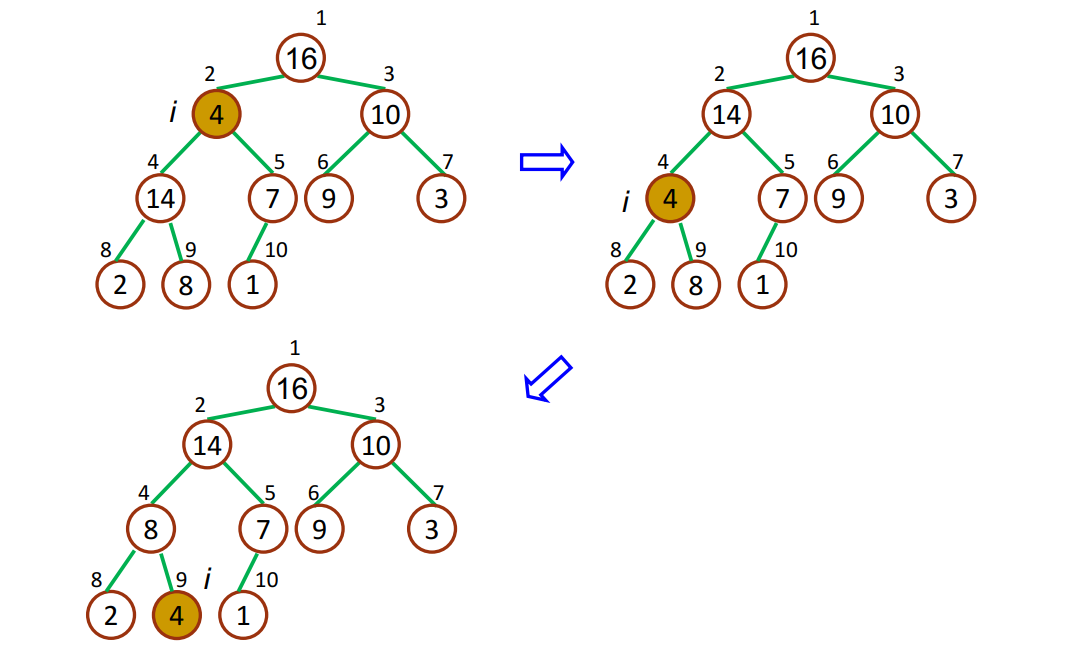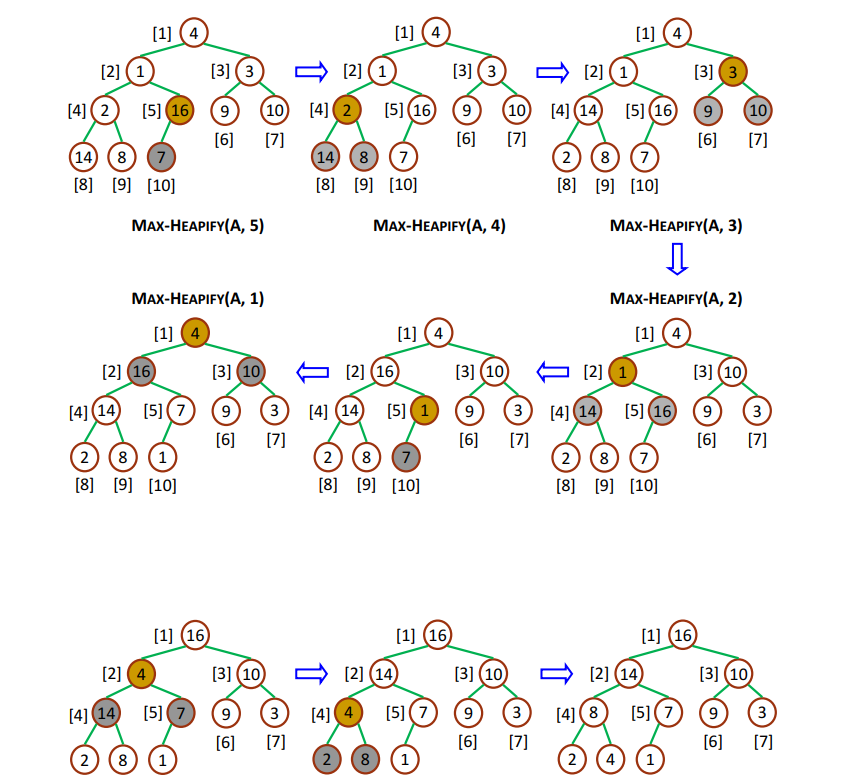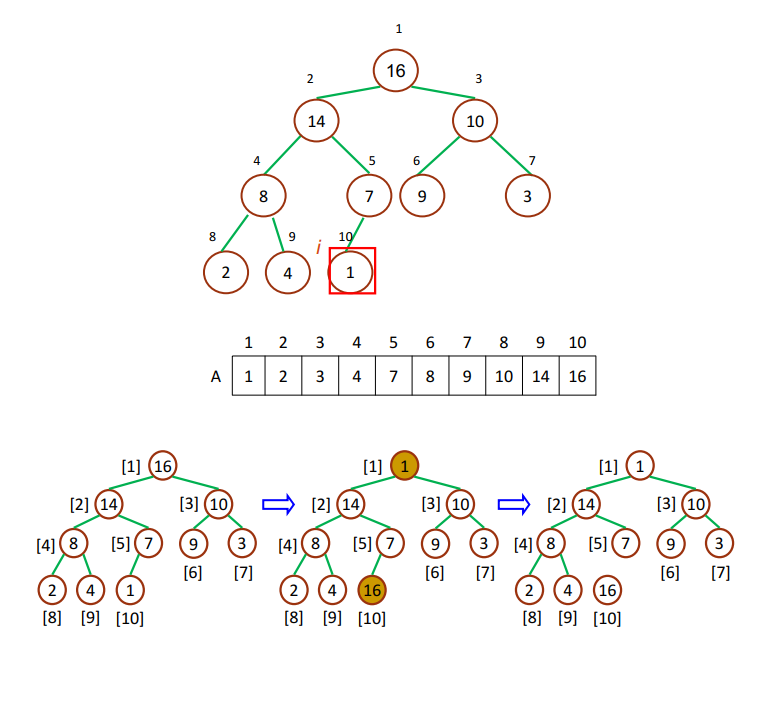Created
March 31, 2018 22:22
-
-
Save gunpreet34/89cb5c5be8a6e150498ddacfb652edd6 to your computer and use it in GitHub Desktop.
Create a MaxHeap from a given non-arranged vector and also implement Heap Sort functionality. Time complexity constraints of all the methods are described.
This file contains bidirectional Unicode text that may be interpreted or compiled differently than what appears below. To review, open the file in an editor that reveals hidden Unicode characters.
Learn more about bidirectional Unicode characters
| #include<bits/stdc++.h> | |
| using namespace std; | |
| class MaxHeap{ | |
| private: | |
| //Variables | |
| vector<int> v; | |
| int size; | |
| //Properties | |
| int left(int i){//Time complexity O(1) | |
| return 2*i + 1; | |
| } | |
| int right(int i){//Time complexity O(1) | |
| return 2*i + 2; | |
| } | |
| void setSize(int sizeVar){//Time complexity O(1) | |
| size = sizeVar; | |
| } | |
| int getSize(){ //Time complexity O(1) | |
| return size; | |
| } | |
| int getHeight(){ //Time complexity O(log(n)) | |
| int count=0,temp = getSize(); | |
| while(temp){ | |
| count++; | |
| temp = temp/2; | |
| } | |
| return count; | |
| } | |
| void maxHeapify(vector<int> vec,int i){ // Time complexity O(h) -> h is height of heap | |
| if(i >= getSize()){ | |
| return; | |
| } | |
| int l,r,largest; | |
| l = left(i); | |
| r = right(i); | |
| largest = i; | |
| //If left child > parent | |
| if(l < getSize() && v[l] > v[i]) | |
| largest = l; | |
| //If right child > largest | |
| if(r < getSize() && v[r] > v[largest]) | |
| largest = r; | |
| if(largest != i){ | |
| swap(v[i],v[largest]); | |
| //maxHeapify(largest); | |
| } | |
| maxHeapify(v,l); //Call maxHeapify for left child | |
| maxHeapify(v,r); //Call maxHeapify for right child | |
| } | |
| public: | |
| //Constructor | |
| MaxHeap(){ | |
| } | |
| //Methods | |
| int getMax(){//Time complexity O(1) | |
| return v[0]; | |
| } | |
| void buildMaxHeap(vector<int> vec){ //Time complexity O(nlog(h)) | |
| v = vec; | |
| setSize(v.size()); | |
| for(int i=getSize()/2;i>=0;i--){ //Logic is to call maxHeapify from (size of heap)/2 instead of just top to cover all the possible non-maxHeapified elements | |
| maxHeapify(v,i); | |
| } | |
| } | |
| void sort(){ //Time complexity O(nlog(n)) -> precisely O(nlog(h)) | |
| buildMaxHeap(v); | |
| for(int i=v.size()-1;i>0;i--){ // n | |
| swap(v[i],v[0]);//Send largest element to the last position | |
| setSize(getSize() - 1); //We decrease size of heap by 1 so that when next maxHeap element is to be swapped it is swapped by second last and so on. | |
| maxHeapify(v,0); // multiplied by log(n) or log(h) | |
| } | |
| setSize(v.size()); // Again set size of heap back to original | |
| for(int i=0;i<getSize();i++){ | |
| cout << v[i] << " "; | |
| } | |
| cout << endl; | |
| buildMaxHeap(v); | |
| } | |
| void display(){ //Time complexity O(n) | |
| for(int i=0,k=0;i<getHeight();i++){ | |
| for(int j=0;j<pow(2,i) && k<getSize();j++,k++){ | |
| cout << v[k] << " "; | |
| } | |
| cout << endl; | |
| } | |
| } | |
| }; | |
| int main(){ | |
| vector <int> v; | |
| for(int i=0;i<15;i++){ | |
| v.push_back(i+1); | |
| } | |
| MaxHeap heap; | |
| heap.buildMaxHeap(v); | |
| heap.display(); | |
| heap.sort(); | |
| heap.display(); | |
| cout << heap.getMax(); | |
| return 0; | |
| } |
Sign up for free
to join this conversation on GitHub.
Already have an account?
Sign in to comment
Example to understand maxHeapify method




Example to understand buildMaxHeap method
Example to understand heapSort
And similar to how it goes for 16, it goes on till we get a sorted array.
PS: Examples are taken from Cormen